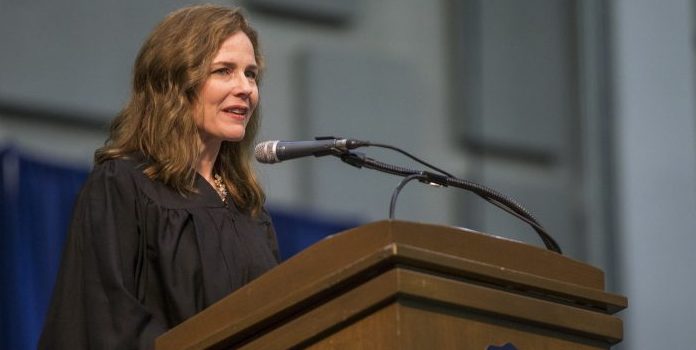(Headline USA) President Donald Trump met with Judge Amy Coney Barrett at the White House as the conservative jurist emerged as a favorite to replace the late Ruth Bader Ginsburg on the Supreme Court, the start of a monumental Senate confirmation fight over objections from Democrats it’s too close to the November election.
Trump said Monday he expects to announce his choice by week’s end, before the burial next week of Ginsburg, the court’s liberal icon, at Arlington National Cemetery. Democrats, but few Republicans, argue that her replacement should be decided by the winner on Nov. 3.
The president told reporters he would interview other candidates and might meet with Judge Barbara Lagoa when he travels to Florida later this week. Conversations in the White House and Senate Majority Leader Mitch McConnell’s office have been increasingly focused on Barrett and Lagoa, according to a person granted anonymity to discuss the private deliberations.
Barrett has long been favored by conservatives, and those familiar with the process said interest inside the White House seemed to be waning for Lagoa amid concerns by some that she did not have a proven record as a conservative jurist. Lagoa has been pushed by some aides who tout her political advantages of being Hispanic and hailing from the key political battleground state of Florida.
Barrett, 48, a judge on the U.S. Court of Appeals for the 7th Circuit, was a strong contender for the seat that eventually went to Brett Kavanaugh in 2018. At the time, Trump told confidants he was “saving” Barrett for Ginsburg’s seat.
Before joining the 7th Circuit, she had made her mark in law primarily as an academic at the University of Notre Dame, where she received a law degree and later began teaching at age 30. She clerked at the U.S. Court of Appeals for the District of Columbia Circuit, clerked at the Supreme Court for Justice Antonin Scalia, worked at the Miller, Cassidy, Larroca & Lewin law firm in Washington, D.C., then returned to Notre Dame.
Barrett has long expressed sympathy with a mode of interpreting the Constitution, called originalism, in which justices decipher original meanings of texts in deciding cases. Many liberals say that approach doesn’t allow the Constitution to change with the times.
Trump has said he would choose a woman, and he admitted that politics may play a role. He gave a nod to another election battleground state, Michigan, and White House officials confirmed he was referring to Joan Larsen, a federal appeals court judge there.
The president also indicated that Allison Jones Rushing, a 38-year-old appellate judge from North Carolina, is on his short list. His team is also actively considering Kate Todd, the White House deputy counsel who has never been a judge but was a clerk for Justice Clarence Thomas.
Democrats, led by presidential nominee Joe Biden, are protesting the Republicans’ rush to replace Ginsburg, saying voters should speak first, on Election Day, and the winner of the White House should fill the vacancy.
Democrats allege, without convincing evidence, that Republicans are trying to rush through a pick so close to the election after McConnell led the GOP in refusing to vote on a nominee of President Barack Obama in February 2016, long before that year’s election.
Biden is appealing to GOP senators to “uphold your constitutional duty, your conscience” and wait until after the election.
Trump said he is planning to name his pick by Friday or Saturday, ahead of the first presidential election debate. With just over a month before the election, McConnell said the Senate has “more than sufficient time.”
Both sides are mobilizing for a wrenching confirmation fight punctuated by crucial issues before the court — healthcare, abortion access and even the potential outcome of the coming presidential election. Some protesters showed up early Monday morning outside the homes of key GOP senators to harass them.
At a Trump rally later Monday in Ohio, people chanted, “Fill the seat!”
As the Senate returned to Washington on Monday, several key GOP senators, including Mitt Romney of Utah, declined to say whether they would agree to a swift vote.
Four Republicans could halt a quick confirmation and Trump criticized Republican Sens. Susan Collins of Maine and Lisa Murkowski of Alaska for opposing a vote before elections. The president warned they would be “very badly hurt” by voters.
Others, including GOP Sens. Chuck Grassley of Iowa and Cory Gardner of Colorado, declined to join in opposing the president’s plan.
Senate Democratic leader Chuck Schumer objected to what he called McConnell’s “utterly craven” pursuit of Supreme Court confirmation under current circumstances, warning — without providing evidence — that it would shatter Senate norms.
“It’s enough to make your head explode,” he said.
Adapted from reporting by Associated Press.

